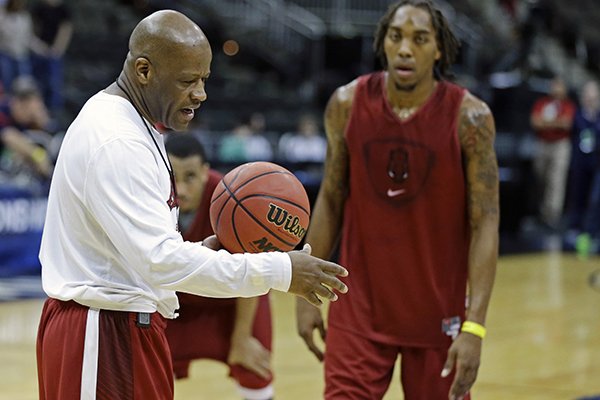FAYETTEVILLE -- Of the 50 college underclassmen who declared for this year's NBA Draft, only Nebraska forward Walter Pitchford and Gardner-Webb guard Jerome Hill withdrew their names.
Nineteen of the remaining 48 underclassmen weren't drafted.
Those numbers could be altered drastically for the 2016 draft if NCAA members in January approve a rule change proposed last week by the men's basketball oversight committee to allow underclassmen to declare for the draft, attend an NBA combine in May and afer getting a recommendation from NBA team personnel have the option to withdraw or remain in the draft.
Kentucky Coach John Calipari was among the members of the National Association of College Basketball Coaches' Board of Directors who worked with NCAA and NBA officials to put together the proposal.
In recent years players had have until mid-April -- two months before the draft and a month before the NBA combine -- to withdraw from the draft under NCAA rules if they enter their names. Under the new proposal, they would be able to delay making a decision until late May.
"To be honest with you, if John Calipari said it's good, I believe it, because he's had more experience with the draft than anybody else in the country," Texas A&M Coach Billy Kennedy said Monday during the SEC coaches' summer teleconference. "It makes a lot of sense and I think it's going to help college basketball when these kids have a better grasp of what's actually going on with the draft."
Calipari has coached 19 first-round draft picks in his six seasons at Kentucky, including 16 who left the Wildcats after one season. Kentucky had six underclassmen drafted this year, including four in the first round led by No. 1 overall pick Karl-Anthony Towns.
Kentucky also had a player enter the draft, sophomore guard Aaron Harrison, who wasn't selected. His twin brother, Andrew Harrison, was a second-round pick at No. 44.
"We're finally moving in a direction where it favors the kids," Calipari said. "That's what we should be doing."
Calipari said the proposal for a combine where NBA personnel provide candid feedback to the players about their draft status is possible because the NCAA is willing to relinquish control to the NBA.
"We on the NABC Board." Calipari said, "met with the NBA to say, 'Let's have a combine where you control it. You invite the players, you work them out, you have meetings with them. You do your thing with them, and then if you recommend to them that they go back to school, that's fine.'
"But for that to work, we have to let the kids come back to school if they're not invited to the combine, or if they go and are told they need to come back to school."
The proposal will put coaches in a situation where they have to wait longer to set their rosters for the next season depending on which underclassmen will or won't be back.
"It's one of those deals that until we experience it, we don't know," Arkansas Coach Mike Anderson said. "But my take on it is, whatever can benefit the student-athlete."
The Razorbacks got mixed results in this year's draft, with sophomore forward Bobby Portis going in the first round to Chicago at the No. 22 pick while junior guard Michael Qualls -- a projected second-round pick -- went undrafted after tearing an anterior cruciate knee ligament during a workout with Phoenix.
Anderson said it would have been nice if Qualls could have gotten feedback about where he likely would be drafted after attending the NBA combine.
Under the proposal, underclassmen not attending the combine should get a strong message from the NBA.
"If you're not invited to it, to me it's a clear signal that you're not one of the guys they're considering," Anderson said. "So it makes it an easy decision for the kid that, 'Hey, I need to continue to develop and really get good enough to where I can have an opportunity to play on that next level.' "
Vanderbilt Coach Kevin Stallings favors the new proposal -- "I think it will be good for the players, so it's probably a good idea," he said -- and added that basketball coaches will have to deal with the draft the way college baseball coaches do.
Underclassmen picked in the baseball draft can negotiate with major-league teams and have until July 17 to decide whether to return to college.
"I would like the players to be able to rectify a bad decision," Stallings said. "You see kids put their name in for the draft, and they don't even get drafted. That's a shame when that happens."
Georgia Coach Mark Fox said recruiting might not be impacted in a major way by the proposal because most top players sign in November, and it would give the players a chance to get as much information and feedback from the NBA as possible.
"Then hopefully student-athletes with listen to the NBA people and not all the people on the outside, which can lead to poor decision," Fox said. "We've got so many guys that have gone out early and not been drafted or had very, very short careers."
Sports on 06/30/2015

